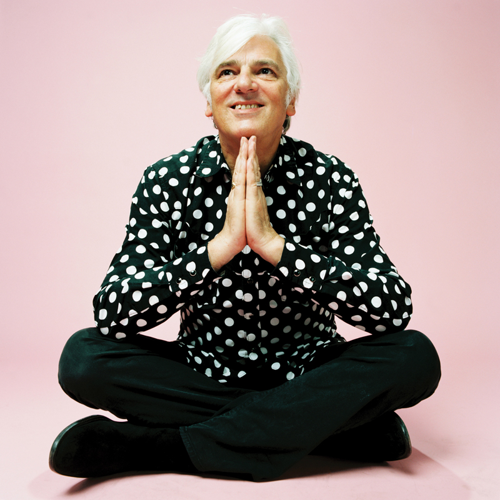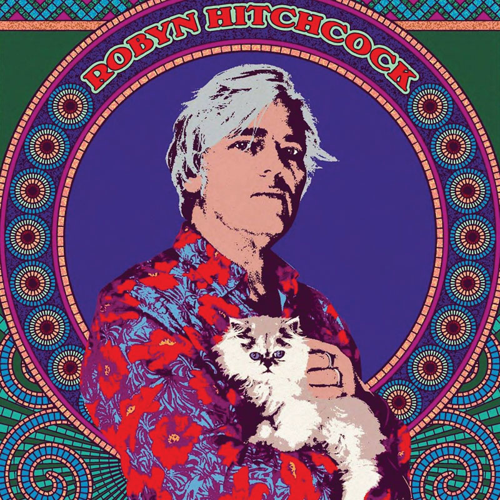
Robyn Hitchcock slides through transitional time on his new self-titled, made-in-Nashville record, one of his most fully realized yet. It seems the location — where he’s lived since August 2015 with his partner, Australian singer-songwriter Emma Swift — suits him.
Hitchcock cut the album last year with noted solo artist and Raconteurs co-frontman Brendan Benson sitting in the producer’s chair at Benson’s Readymade Studios. Leading a group of Music City players who fashion a pocket for Hitchcock’s post-British Invasion music that stays sewed up tight, Benson provides rich textures for a group of first-rate songs. Hitchcock’s latest music draws power from the way Benson and the band rework the conventions of Nashville’s storied studio rhythm sections. The artist’s biologically determinist worldview gets the nuanced musical backing it deserves, and he sounds relaxed even when he’s japing at the dying of the light.
Robyn Hitchcock is the first solo record that the London-born singer, who is 63, has recorded since making Nashville his hometown, but he’s worked here before. Calling in from a tour stop in Texas, Hitchcock recalls his 2004 album Spooked, recorded with Gillian Welch and Dave Rawlings.
“I’m in sort of a Gill-and-Dave sandwich, and I’m playing acoustic guitar on [Spooked],” Hitchcock says. “This record’s very different. Everything is two electric guitars, bass and drums.”
With Nashville guitarist and singer Anne McCue providing most of the rhythm guitar, Robyn Hitchcock features the Englishman’s lead lines. “The tracking was done quickly, and I overdubbed the lead guitar in most places,” he says. “I asked Brendan to not let me get away without playing lead, ’cause I tend not to on record.”
Hitchcock’s licks punctuate the record’s “Virginia Woolf,” a song that compares the travails of the English novelist with those of American poet Sylvia Plath, both of whom committed suicide. Like all of Robyn Hitchcock, the track puts forward the songwriter’s mordant view of human affairs. “Virginia Woolf, she was good for a quote,” he sings. “Virginia Woolf knew that stones do not float / She was all right.”
I tell Hitchcock the lines make me laugh, and he seems pleased by that response. “[Woolf] and Sylvia Plath were both great writers who found life unbearable, and they ended their own lives,” he says. “They were at odds with life. Life didn’t agree with them. But it doesn’t mean they were wrong. What they were doing was right. They just couldn’t sustain life as human beings.”
Concise and uncluttered, “Virginia Woolf” updates the sound of Hitchcock’s famed late-’70s and early-’80s band The Soft Boys. If such now-classic Soft Boys tracks as “Only the Stones Remain” and “Kingdom of Love” added post-punk aggression to ’60s guitar rock, Hitchcock’s new music is an apotheosis of the form.
“It goes back to Buddy Holly, really, or certainly The Beatles and The Searchers and The Byrds, and then Big Star and The Soft Boys,” says Hitchcock of his favored idiom. “Every so often it just suits a kind of lineup. This is a Robyn Hitchcock record, but it’s a band sound.”

The band’s finesse enlivens “Time Coast,” a superb composition that sums up Hitchcock’s preoccupation with time, distance and the pull of biological and social demands. Drummer Jon Radford turns the beat around in the introduction, and the song repays close listening: Hitchcock adds measures of 2/4 to a bone-simple rock tune that benefits from his guitar obbligato and Radford’s canny offbeats.
Radford and bassist Jon Estes play a major role in defining the approach of Robyn Hitchcock. On a record replete with gorgeous backing vocals and fluid guitar playing, Radford’s tactful drumming revisits various British Invasion styles. Born in Clarksville, Tenn., in 1978, Radford was playing with Estes in local soul-country instrumental band Steelism when Hitchcock caught the group’s performances at Nashville’s 2015 AmericanaFest. Impressed by what he heard, he tapped Estes and Radford to play on the record.
Radford, who wasn’t familiar with Hitchcock’s Soft Boys recordings when he began working with him, says making the record was a collaborative process. “Robyn played the songs, we kind of caught an idea for it, and we went,” he says. The result is perhaps Hitchcock’s finest full-length to date, and a record of addictive complexity and vexed sympathy for the doomed human race.
“It’s kinda like ‘Robyn Hitchcock in Nashville,’ ” Radford says. “I got to send an homage back to all my favorite British Invasion drummers. But to me, it sounds like here, right now.”







